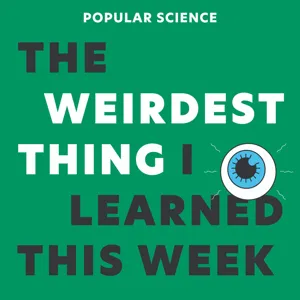Podcast Summary
Discovering Skilled Professionals and Advancements in Agriculture: Angie's platform streamlines home services, Bayer uses AI and CRISPR for sustainable agriculture, and technology shapes our world in various ways.
Technology is revolutionizing various industries, making things easier and more efficient for individuals. Angie's home services platform simplifies the process of finding and hiring skilled professionals for home projects, while Bayer's use of artificial intelligence and CRISPR technology in agriculture aims to increase food production sustainably. Freud's theory about foot fetishes may be controversial, but it highlights the intriguing connections between different areas of human thought. The editors of Popular Science share intriguing facts and stories, promising exciting episodes and live shows in the future. Overall, technology continues to shape our world in significant ways, from maintaining homes to producing food and beyond.
Study shows early experiences shaping sexual preferences in rats: Early experiences can influence the development of sexual preferences, as shown in a study where rats preferred females in jackets after initial mating experiences. The media's focus on men and lingerie oversimplified the findings, limiting the discussion to a narrow aspect of sexuality.
Our weekly discussions often uncover fascinating and unexpected findings in various scientific fields. This week, we learned about a study where researchers conditioned rats to prefer females wearing jackets during mating. The rats, who were virgin males, were first exposed to females in jackets during their first mating experiences. As a result, they developed a preference for females in jackets and would mate more frequently with them. This study is an example of how early experiences can shape sexual preferences. However, the media coverage of this study annoyed some of us as it focused on the idea that men like lingerie, oversimplifying the findings and limiting the discussion to a specific and socially conditioned aspect of sexuality. It's important to broaden the conversation to include a wider range of sexual preferences and understand the underlying reasons behind them.
The Evolution of Understanding Fetishes and Atypical Sexual Preferences: The DSM-5 no longer considers fetishes as disorders unless they cause harm or distress, and research suggests that childhood conditioning and brain wiring differences may contribute to their development.
Our understanding of fetishes and atypical sexual preferences has evolved significantly over the years. Originally labeled as sexual deviations, these preferences were diagnosed as psychological conditions in the DSM. However, this perspective changed in the DSM-5, with paraphilias only being considered disorders if they cause harm or distress to the individual or others. Research suggests that conditioning during childhood may play a role in the development of certain fetishes, but the causes are still not fully understood. Some studies indicate that there may be physical brain wiring differences in individuals with certain fetishes. For instance, a 1954 study in The Lancet explored pin fetishism, where individuals find safety pins as objects of aesthetic appreciation, rather than using them for pain. Overall, the complexity of human sexuality continues to be a fascinating and intriguing area of research.
A man's obsession with safety pins led to seizures and brain surgery: The brain can form strong connections to seemingly mundane objects, leading to unique fixations, as seen in a man's obsession with safety pins and its impact on his health.
The human brain can form strong connections to seemingly mundane objects, leading to unique and sometimes unusual fixations. This was illustrated in a case study from 1954, where a man with epilepsy reported a strong sensual attraction to safety pins, leading to seizures that could only be treated with a brain surgery. The man's fascination with safety pins was so intense that it disappeared after the surgery, suggesting a direct brain-fetish relationship. Furthermore, research suggests that the brain areas responsible for processing sensory information from the feet and genitals are in close proximity, potentially explaining the common foot fetish. These findings highlight the complex and intriguing ways in which the brain processes sensory information and forms preferences and fixations.
The Complexities of Human Psychology and Urban Development: Mayor Bill de Blasio aims to invest $10 billion to expand NYC's financial district's East River Waterfront, while the city's history of growth on oyster shells and decline of oyster population showcases the complexities of human behavior and urban development.
Human psychology and sexuality are complex and influenced by both physical brain components and conditioning. Meanwhile, in the realm of infrastructure, New York City's mayor, Bill de Blasio, aims to invest $10 billion to expand the financial district's East River Waterfront by 500 feet to protect against sea level rise and storms. An interesting fact about New York City is that it was initially built on oyster shells, with an estimated 3 trillion oysters in its waters when Europeans arrived. However, the city's growth led to the decline of the oyster population, making it an unlikely habitat for marine life today. The expansion plan involves building new land into the river to create a protective barrier for vital structures. This historical and current context highlights the intricacies of human behavior and urban development.
New York City's obsession with oysters led to their overconsumption and destruction: Overconsumption of oysters led to loss of waste filtration, natural seawall protection, and harm to human health. Ignoring natural resource health has far-reaching consequences.
New York City's obsession with oysters led to their overconsumption and the destruction of their natural habitats, which had far-reaching consequences. Oysters, which were once a staple food and natural filters in New York Harbor, were being eaten at an unsustainable rate, while human waste and pollutants, including heavy metals and PCBs, were causing harm to both the oysters and those who consumed them. This not only resulted in the loss of a vital resource for waste filtration but also led to the disappearance of a natural seawall that protected the city from storms and waves. The devastating effects of this destruction were only realized when it was too late, and the oysters were gone. Today, there are still some oysters in the Gowanus and other bodies of water, but they are nowhere near their former numbers. The loss of oysters serves as a reminder of the importance of sustainability and the consequences of ignoring the health of our natural resources.
Oysters' Role in New York City's Water Filtration System: Oysters naturally filtered New York City's water, contributing to healthier environments. The Billion Oyster Project recycles and plants oyster shells to restore these ecosystems, improving water quality and supporting local flavors.
Oysters played a significant role in the history of New York City's water filtration system. These bivalves naturally filtered the water, creating healthier environments for both Manhattan and Long Island. Now, there's a movement to bring back the oysters through projects like the Billion Oyster Project. They recycle oyster shells and plant new ones to establish thriving communities. Although the water is still polluted, this initiative aims to prove that oysters can help clean it and contribute to a healthier New York City environment. This process is not just limited to New York; other regions with suitable conditions can also benefit from oyster restoration. The distinct flavors of oysters depend on their regional environments, with some, like those from Northern Washington State and Southern British Columbia, being particularly prized for their hyper-local tastes. It's important to note that these oysters are not intended for consumption in the context of the Billion Oyster Project. Instead, it's a delicate balance between protecting these ecosystems and acknowledging their environmental benefits. Despite the challenges, the potential impact of these creatures is impressive, with each oyster filtering up to 50 gallons of water per day.
The Banana's American Debut at the Centennial International Exhibition in 1876: The banana, initially a luxury item from Southeast Asia, became a staple in American culture after its debut at the Centennial International Exhibition in 1876.
The banana, a beloved fruit, was first introduced to America at the Centennial International Exhibition in Philadelphia in 1876. This fair, held to celebrate the 100th anniversary of the Declaration of Independence, attracted millions of visitors and showcased consumer products for the first time. The banana, initially a luxury item, originated in Southeast Asia and had been cultivated as early as 1000 BC. When it arrived in the United States, it became a staple in American culture. Today, we can buy bananas for a dollar or less, but in 1876, they were a novelty. The PopSci tech team encourages listeners to subscribe to their podcast, Techathlon, for the latest tech news presented in a fun and interactive way.
The 1876 Centennial Exhibition introduced bananas as a luxury item: The 1876 Centennial Exhibition popularized bananas as a desirable and expensive fruit, eventually leading to their widespread availability in America by the late 1880s
The 1876 Centennial Exhibition in Philadelphia introduced many innovations and items to the American public, some of which became symbols of luxury and success. Among these were the telephone, typewriter, Heinz ketchup, Hyer's root beer, and the Statue of Liberty. However, one unexpected hit was the banana. Originally an expensive and elusive luxury item, bananas gained popularity at the exhibition, where they were served in tinfoil with a fork and knife for a high price. After the exhibition, bananas remained a rare and desirable treat until a sea captain named Lorenzo Baker brought them back from Jamaica and started selling them more widely. By the late 1880s, bananas had become a popular and widely available fruit in America, thanks to the Boston Fruit Company. It's fascinating how an item as commonplace as a banana today once held such allure and exclusivity.
Discovering the origins of super foods and oysters' ecological role: Learned about the origins of various super foods, the importance of respecting nature, oysters' ecological role, popular science podcast, Angie's platform, and reducing paint waste with PaintCare
We learned about the origins of various "super foods" and the importance of respecting nature. None of these foods, such as avocados and coconuts, originated in the US. Hipsters might have a tough time without these foods! The most intriguing discovery for some was the ecological role of oysters, which are not meant for human consumption. Instead, they play a crucial role in maintaining ecosystems. Another interesting revelation was the availability of a popular science podcast and the ease of subscribing and supporting it. The podcast, which can be found on all major platforms, offers valuable insights and knowledge. Additionally, Angie's platform was introduced as a solution for homeowners looking to hire skilled professionals for various projects. Angie simplifies the process by connecting users with local pros and managing the project from start to finish. Lastly, PaintCare was discussed as a resource for reducing paint waste by following three simple rules: buying only what's needed, using up existing paint, and recycling the rest. Convenient drop-off locations at local paint stores make this process easy and eco-friendly.






